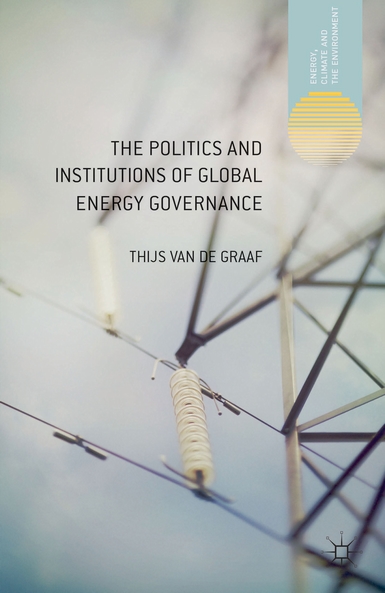 The Politics and Institutions of Global Energy Governance
The Politics and Institutions of Global Energy Governance
by Thijs Van de Graaf
Publisher: Palgrave
Published: October 4, 2013
See flyer and full details.
From climate change over shale gas to the race for the Arctic, energy makes headlines in international politics almost daily. Thijs Van de Graaf argues that energy is in dire need of global governance. He traces the history of international energy cooperation from the notorious ‘Seven Sisters’ oil-companies cartel to the recent creation of the International Renewable Energy Agency (IRENA). He analyses how international institutions have been created for securing oil rents, coordinating consumer-countries’ energy security policies, promoting producer-consumer dialogue, managing regional gas markets, and dealing with energy-related environmental externalities. Drawing on the emerging regime complexity literature, he constructs a novel analytical framework to explain the fragmented architecture of global energy governance, and studies prospects for institutional reform at the International Energy Agency (IEA) and the G8/G20.
Contents
1. Introduction
2. Energy and global governance
3. Morphogenesis of the energy regime complex
4. Interpreting the global energy architecture
5. Adaptation at the core: reform of the IEA
6. Diverging from the path: the creation of IRENA
7. The G8 and G20 as energy steering committees?
8. Conclusions
Reviews & Praise
‘Thijs Van de Graaf has written a fascinating analytical narrative of the international energy regime complex, with systematic and illuminating analysis of sources of change and continuity as a basis for policy recommendations about institutional design. The Politics and Institutions of Global Energy Governance is a valuable contribution to our understanding of how regime complexes change as well as a perceptive study of global energy politics.’
Robert O. Keohane, Professor of Public and International Affairs, Woodrow Wilson School of Public and International Affairs, Princeton University.
‘Thijs Van de Graaf’s book offers an insightful, rich and compelling analysis of the historical evolution and current fragmentation of the architecture of global energy governance, covering most major institutions, including the new International Renewable Energy Agency. This book is highly recommended for all scholars and students of global energy governance, climate politics, and the emergence and interplay of international organizations.’
Frank Biermann, professor and head, Department of Environmental Policy Analysis, VU University Amsterdam, and chair, Earth System Governance Project.
‘A cogent and much needed book for anybody interested in understanding how the global energy system functions politically and institutionally. It richly explores topics as diverse as oil security, renewable energy, energy poverty, electricity reliability, and the contours of the International Energy Agency and G20. A good read that will remain on my shelf for years to come.’
Benjamin K. Sovacool, Professor of Social Sciences at the School of Business and Social Sciences at Aarhus University in Denmark, and Associate Professor of Law at Vermont Law School.
‘This book is likely to be of interest primarily to academic readers: it discusses the need to look at the ‘regime complex’—clustering analysis around different activities and institutions which overlap problems. It discusses in mainly theoretical terms the processes which generate new institutions, and the interests of powerful countries able to shape those processes. These interests may determine the balance of advantage between incurring the costs and difficulties of setting up new institutions, and the struggle necessary to reform the institutions which exist already and to develop effective links between them.’
International Affairs
‘Thijs Van de Graaf’s analysis of … the global energy regime complex suggests that its overall architecture is inadequate to provide energy security, combat energy poverty, support environmental sustainability, or shore up national efforts to mediate the impacts of global energy markets on domestic economies. Hence, he develops and applies an analytical framework premised on the underlying distribution of state preferences and capabilities, attributes that are specific to governance among energy-consuming nation-states, and institutional feedbacks.’
Global Environmental Politics
‘Van de Graaf’s book should be required reading for anyone interested in energy governance. […] In a brief, well-written and extremely accessible 166 pages, [it] provides a comprehensive overview of the field, makes persuasive causal arguments about institutional choices, and draws from those arguments highly relevant policy prescriptions. The book should be a starting point for everyone thinking about how to solve energy problems in the 21st century.’
Carbon & Climate Law Review
‘The book is highly recommended to scholars and researchers in energy and governance issues, energy policy makers in governments, energy practitioners including energy lawyers, as well as anyone interested in the energy-climate change nexus or in learning about what has shaped global energy politics and economics’
Review of European, Comparative and International Environmental Law